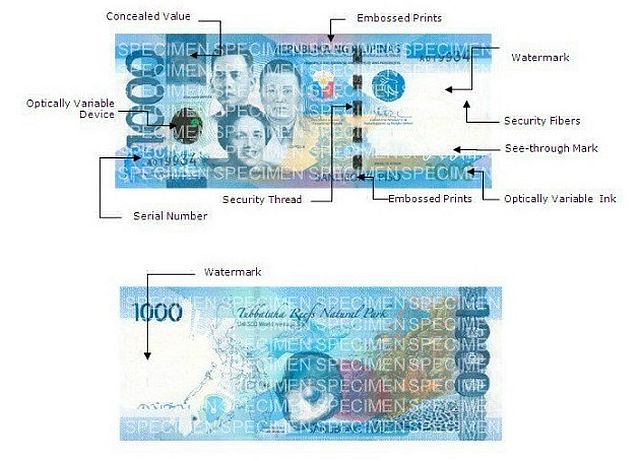
SOURCE: BSP
The Bangko Sentral ng Pilipinas (BSP) has constantly reminded the public to be vigilant on the proliferation of counterfeit money.
Lawyer Leonides Sumbi, BSP Cebu regional director, said the public should be very careful, especially in dealing with P1,000, P500 and P200 bills since these are the most common denominations that are counterfeited.
One way to find out if New Generation Currency (NGC) bills are genuine is to feel the surface of the paper using one’s fingertips.
“They are rough and coarse in texture. If it is smooth, then it is fake,” she said in an earlier interview.
The BSP has constantly urged the public to report counterfeiting incidents, if the situation warrants, to its Currency Issue and Integrity Office (CIIO).
According to the BSP, other security features of NGC bills the public can check to see whether these are genuine are:
• They do not glow under ultraviolet light but feel substantial and solid to touch.
• The watermark figure or the silhouette of the portrait on the face of the note is solid, distinct, well-defined.
• The security colored fibers are red and blue visible fibers embedded and scattered at random on both surfaces of the bill.
• Embedded metallic threads are implanted vertically off center of the banknotes and appear as a broken line for P5, P10 and P20 denominations and a continuous line for P50, P100, P200, P500, and P1,000 bills. The prints like Republika ng Pilipinas (Republic of the Philippines), amount in words and numerical figures at the lower right hand of the banknotes and signatures are clearly printed and readable.
• Serial numbers are composed of one or two prefix letters and 6 to 7 digits that are also clearly printed, and uniform in size and thickness on the banknotes.
• A shiny, 10-millimeter gold-colored stripe, with the numerical value printed in series is placed vertically across the portrait and appears on the new version of the P100, P200, P500 and P1,000 banknotes.